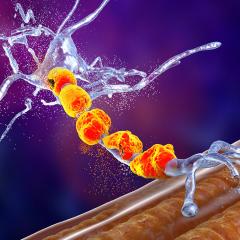Motor Neurone Disease (MND) research at QBI
Queensland Brain Institute (QBI) neuroscientists are using a multidisciplinary approach to improve the understanding of motor neurone disease.
A small proportion of MND patients carry mutations in the superoxide dismutase (SOD1) gene and earlier research has found transgenic mice carrying the mutant SOD1 gene undergo progressive motor neuron loss. As such, QBI researchers are now investigating ways of preventing cell death associated with MND in SOD1 mice.
Additionally, researchers are assessing the usefulness of MRI for monitoring disease progression, searching for MND biomarkers in patient blood samples and understanding the role of the TDP-43 protein aggregation. TDP-43 is a DNA binding protein involved in gene regulation – its function in the nervous system is currently unknown and its role in the pathogenesis of MND remains unclear.
QBI is co-leading Australia's largest collaborative project in the search for new risk genes and therapies to treat MND using whole genome analysis to collectively identify new risk genes. Comprising 16 researchers from nine MND centres across Australia, as well as international collaborators, the consortium will build an integrated infrastructure to collect and analyse biological samples and clinical data.
With MND treatment still a long way off, early diagnosis and the subsequent management and care of the patient are critical. QBI is currently working with MND patients to determine whether MND-specific biomarkers exist in the blood and whether these markers can be used to predict the course of the disease.
MND research at the Queensland Brain Institute is possible largely because of our many donors, including Peter Goodenough, Ross Maclean, and Lyn and Bobbie Brazil. The Peter Goodenough and Wantoks Research Laboratory, the Ross Maclean Senior Research Fellowship and the Brazil Family Program for Neurology are named respectively in their honour.
MND research news
- Government partnership leads to motor neurone disease drug candidate
- MND progression linked to metabolic overdrive
- Ancestry plays role in MND risk gene
QBI MND researchers
Professor Perry Bartlett has established that a gene, EphA4, regulates MND progression through its involvement in motor neuron loss in the spinal cord. In his laboratory, Dr Jing Zhao is investigating the impact of different forms of this gene on MND progression, and identified it as a potential therapeutic target.
Dr Adam Walker and his lab use biochemistry and imaging techniques to investigate a key protein (TPD-43) linked to MND and fronto-temporal dementia. Studies in the lab aim to identify the key components of TDP-43 pathology and the causes of TDP-43 malfunction, and to determine the role of cellular stress responses and glial alterations in disease pathogenesis. They are now also conducting pre-clinical studies in collaboration with other laboratories in Australia and the USA, to test potential drug candidates for MND and fronto-temporal dementia.
QBI Director Professor Pankaj Sah’s laboratory are testing interventions for MND that have the potential to be developed into treatments. Dr Margreet Ridder is using genetic techniques in a mouse model of MND to prevent motor neurons in the spinal cord from dying.
If you would like more information about MND, or require support, please contact MND Australia on 02 9816 5322 or info@mndaust.asn.au



